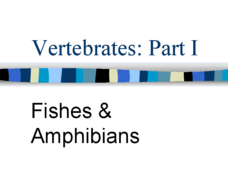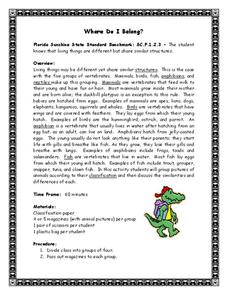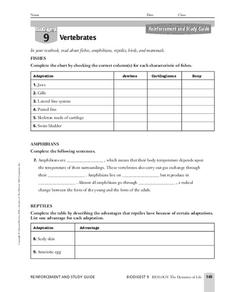Curated OER
Vertebrates: Part I, Fishes & Amphibians
A simple set of slides shares the three classes of fish and the class amphibia. The first three slides cover fish characteristics and structure, while the last three cover amphibian characteristics and life cycle. Though somewhat...
Curated OER
What Class Are You In?
Classifying animals has never been this much fun! Pupils discuss the animal groups, fish, reptiles, amphibians, mammals, birds, and also identify their characteristics. Then, they take pictures of animals and classify them in a group...
Curated OER
Fish, Amphibians, Frogs
In this science worksheet, students use basic scientific concepts to complete the series of puzzles that are intended to increase science literacy for telling the differences between fish and amphibians.
Curated OER
Fishes and Amphibians
In this fish and amphibian characteristics worksheet, students will two idea maps to compare fishes and amphibians. Students will complete 2 short answer questions based on these idea maps.
Biology Junction
Amphibians
Biologists know of more than 2,300 living species of amphibians. Learn more about the four orders of amphibians with an interesting presentation. It explains the similarities and differences between the thousands of species of...
Curated OER
Amphibians
In this amphibian worksheet, students read about the frog life cycle to complete the Venn diagram. They also answer 16 fill in the blank questions about frogs.
Curated OER
Who Am I? Fish, Turtles, Amphibians
In this science worksheet, young scholars examine 16 detailed pictures of different species of fish, turtles and amphibians. Students identify each species. There is no room to write the name under the picture. It is assumed this is an...
Curated OER
Reptiles and Amphibians
Fourth graders explore biology by viewing animal videos in class. In this amphibian and reptile lesson, 4th graders identify the key differences between reptiles, amphibians and other animal classifications. Students view video clips in...
Curated OER
Fishes and Amphibians
In this fish and amphibian worksheet, students will compare a diagram of an invertebrate chordate with a diagram of a fish and complete 2 short answer questions. Then students will name four characteristics that allow amphibians to live...
Curated OER
The Five Classes of Vertebrates
What a terrific lesson! Learners discuss the animal kingdom, and classify them as vertebrates and invertebrates. They also identify them as fish, amphibians, reptiles, birds, and mammals. There is even a taxonomic breakdown of popular...
Curated OER
Amphibians Crossword Puzzle
In this biology instructional activity, high schoolers complete a crossword puzzle with 24 questions about different types of amphibians and functions of their body parts.
Curated OER
Describing Animals
While a short review of animals and their classifications, this could be useful when discussing this topic in the classroom. There is a list of questions at the end to help review the main ideas. Reptiles, amphibians, and mammals are...
Curated OER
Sunken Millions Animals
This PowerPoint includes a game with ocean graphics in which two teams answer increasingly difficult questions about animals. Topics covered include plant and animal cells, animal adaptation, and similarities and differences between...
Curated OER
Fishes
In this fish worksheet, students will review the characteristics of fish by comparing the jaws, skeleton, and fertilization of each fish class. Then students will use a phylogenetic tree to compare the groups of fish to ancestral...
Curated OER
Animal Classes-Mammal Birds Fish Reptiles Amphibian
Students learn about the characteristics of each animal classification. In this animal classification lesson students will first learn the characteristics of each classification. Then, they will find animals from given materials and...
Curated OER
Animals Belong in Class
For this classifying animals worksheet, students use the information in the word bank to complete the T-Chart about mammals, birds, fish, reptiles, amphibians, and arthropods. Students write 10 answers.
Curated OER
Classification of Animals
This is one of the better presentations I've seen on the classification of animals. Youngsters view slides that introduce the characteristics of each of the animals groups through the use of photographs and text. Then, they are given...
Curated OER
Where Do I Belong?
Fourth graders work in groups. They are given magazines. Students cut pictures of five mamals, five birds, five reptiles, five amphibians, and five fish. They place the pictures in a plastic bag. Students switch bags. They are explained...
Curated OER
Vertebrates
In this vertebrate learning exercise, students review the different adaptations for the 5 groups of vertebrates: birds, mammals, reptiles, amphibians, and fishes. This learning exercise has 12 matching, 1 fill in the blank, and 7 short...
Curated OER
Amphibians
In this amphibian worksheet, students will review the characteristics of the class Amphibia, including frogs and toads, salamanders, and caecilians. This worksheet has 3 short answer questions, 5 matching questions, 6 multiple choice,...
Curated OER
Types of Animals
Learning about animals, and their classifications, is a regular part of the elementary-school curriculum. Using this presentation, learners can review information relating to animal classification, and test their knowledge. This would be...
Curated OER
What Are Reptiles, Amphibians, And Fish?
In this animal classification worksheet, students will compare and contrast the characteristics of reptiles, amphibians, and fish. This worksheet is a graphic organizer.
Larson Lab
Animal Classification
How are animals classified? Scholars explore animal classification by observing non-living and living specimens. They learn how to organize animals into vertebrates and invertebrates and identify the five vertebrate groups: mammals,...
Curated OER
Animal Classification
Third graders differentiate between vertebrates and invertebrates, and identify the main characteristics of mammals, fish, reptiles, amphibians, and birds. They sort and categorize different types of balls, discuss the characteristics...

























